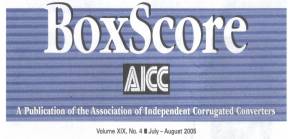

Is Price Really The Focus?
Ask a sales rep why he made a sale. Will he tell
you it was because of the price? Sometimes, however
most times he will tell you the sale was made because
of the relationship he built with the customer,
giving an accurate assessment of the professional
qualities he brought to the sales process that
won the business. On the other hand, ask the same
sales rep why a particular sale was not made. It
is likely that the first answer will be, "Price!"
Negotiation is an exchange of resources between
two parties. When it works well, it is a kind of
professional sharing leading to an agreement in
which both parties are satisfied that they did
their jobs in getting the best deal possible. Pricing
is clearly important yet when I interviewed box
buyers for the AICC, they stated, when making buying
decisions, that professionalism and trustworthiness
were by far more important than the price of the
box. I see this same purchasing perspective in
other industries as I conduct programs on negotiation
across the country.
I would say that the biggest challenge sellers
face when trying to make a sale is that they often
appear self-focused to the buyers they meet. This
is not to suggest that box sellers are generally
unprofessional. In my view, it is just the opposite.
I consistently see, in the Independent box companies
I meet, a high level of professionalism. However,
the industry itself has gone through wrenching
change over the past five years. Predictability
is gone. Individual and company security - both
for seller and buyer - are concepts that
have gone into hibernation for many. A sort of
hunkering down and facing the fire of today seems
to be the order of things presently. It is hard,
and often seems pointless, to take the time to
build relationships in the way they were built
in the past. We all worry, buyers and sellers alike,
that no relationship is as solid and predictable
as we hope it to be. So, it is not surprising that
sales people out in the field, whether attempting
to gain new business or build success with their
existing customers, are working harder than ever
to deal with the daily pressures they face.
Negotiation is a process filled with tension.
Tension, pressure and fear lead to a patterned
response of self-protection that leads the other
party to become self-protective as well. When trust
is not established, when a sales person becomes
reactive and loses his calm, balanced self-confidence,
tensions rise and both parties become self-focused.
Under this condition it is natural to get bogged
down in price discussions/debates. Professional
demeanor is diminished and the customer closes
off to the value the seller wishes to communicate.
Often, an atmosphere of mutual defensiveness has
been established before the sales person has finished
saying, "Thank you for taking the time to
see me."
Clearly a sales person needs to know how to handle
price discussions, however if that sales rep does
not handle pressure and fear first, then it will
follow that he/she will appear self-focused to
the buyer and that buyer will lead the seller down
the price path.
I would suggest that the primary negotiation is
not between buyer and seller over price. Instead,
it is one that takes place at the sales rep's
own plant, in the mind of each individual, regarding
whether or not to establish a shared atmosphere
of leadership and cooperation within their
own company. It helps when this is a value communicated
clearly from the top, however it is in each person's
best interest to work to establish such a culture
by sharing their willingness to listen, respect
and care about their co-workers - even when
it appears that such values are not being immediately
returned. Building upon the principle of reciprocity
using the resources of listening, respect and care
with co-workers, a culture of leadership can be
established. When one person chooses to share these
resources it makes it easier for others to do their
jobs well. When a company chooses to reinforce
these values together it builds internal balance
and confidence and the company as a whole demonstrates
greater attractiveness to its customers. In other
words, "teamwork is truly the key to success." When
it is practically implemented, sales will naturally
increase.
An atmosphere of trust and open communication
between Plant, Sales, Human Resources and Management
are the keys to a thriving business. Where there
is internal alignment within a company, more confident
selling will naturally follow.
Mark Neely
July 2005
©2005 Text as it appeared
in BoxScore Publication Vol. XIX, No. 4 July-August
2005
< back to Articles & Resources main page |